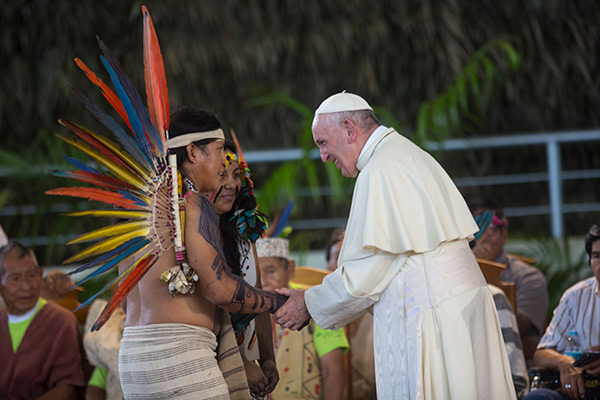As the Synod of Bishops from the Amazon continues to make headlines, many are curious about the contents of its forthcoming report. According to Pope Francis, the synod’s goal is “to identify new paths for the evangelization of God’s people in that region,” with a particular emphasis on the region’s indigenous people, who are “often forgotten and without the prospect of a serene future.”
Unfortunately, given the working document that’s already been released, as well as the various participants involved, many expect these “new paths” to include the Roman Catholic Church’s ongoing flirtations with liberation theology. As Kishore Jayabalan recently wrote here on the blog, “The tendency to blame capitalism for the ills of the region, the animus against a hierarchical Church, and the hopes for a socialist utopia are alive and well in the synod preparations.”
Yet for one tribal chief, this tendency has mostly served to inhibit the region’s indigenous peoples, holding them back from economic progress rather than toward a “serene future.”
According to the National Catholic Register, Jonas Marcolino Macuxí, a Protestant convert and chief of the Macuxi tribe, fears that the synod’s conclusions will offer yet more of the same:
An Amazon tribal chief told a Rome conference on Saturday that a “dictatorship” of missionary workers teaching liberation theology has sought to prevent development in the region, thus keeping indigenous people in poverty and misery.
[Marcolino]…asserted such promotion of “primitivism” (an ideology that pre-Christian indigenous traditions and mores were largely noble and good and should be conserved) brought conflict to the region from the 1970s on, undoing all that earlier missionaries and indigenous peoples had achieved in terms of positive cultural assimilation for more than a century.
He also expressed concern that many of those advising the Pope on the synod have this same ideology and that the indigenous invited to attend it have been “indoctrinated to remain in their primitive state.”
The article notes that Marcolino “was baptized Catholic but became Protestant, partly because of the state of the Catholic Church in the region.” In a corresponding interview, he shares his discouragement about the prevailing attitudes. “Beginning in 1980, the tendency has been to see any kind of development in the Amazon—roads, big projects, etc.—as part of this idea that progress is bad,” he explains. “…Until the 1980s, the military regime had a positive view of development, but as military rule ended, there was specifically an element that said progress is bad, and we have to go back.”
Indeed, though many are quick to acknowledge the struggles of the region’s indigenous peoples, there is a peculiar propensity to blame markets and romanticize the very features that contribute to such suffering. According to Marcolino, many would prefer the comforts and stability that can come from economic modernization, never mind the corresponding social improvements. “These liberation theologians are promoting the idea that the Indians who still live in a primitive way are very happy, living in paradise, etc., and wanting to promote this idea to everybody else,” he says. “But that’s not true. It’s false. We are not living in paradise. It’s a very hard life.”
When asked directly if “a free-market economy is the way to overcome this,” Marcolino heartily agreed:
Yes, exactly; we should be allowed to develop our economy, because the region is very rich. All the natural resources are there. But in the Indian reserves, you cannot touch them, and that’s to the detriment of the people who live there. They [those who wish to keep them primitive] have neutralized reason. It’s obvious those things should be explored, but we’re not allowed to do it. We’re not allowed to use our intelligence to utilize the things that are present where we live.
Whatever the particular conclusions of the Amazon synod, Marcolino’s perspective offers a healthy challenge the typical myths about the region: social, economic, environmental, and otherwise.
If our goal is truly to help and empower those who are “forgotten and without the prospect of a serene future,” we’d do well to heed his longing, moving toward more prospects and pathways for ownership, growth, and creative exchange—not fewer.
